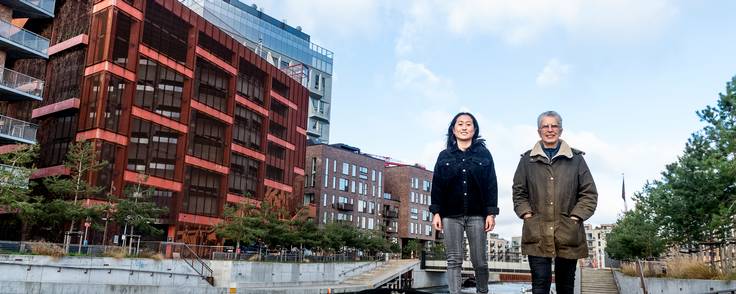
The City of Copenhagen’s urban development company must pay DKK 900 million. DKK, if the case for payment to Metro is lost. The municipal company’s lawyer on the case assessed the exam paper behind the lawsuit to the top grade 12.
Copenhagen Municipality’s urban development company, By & Havn, stands to lose an income of DKK 900 million. DKK, if a resident of the new Copenhagen North Harbor is upheld in an upcoming lawsuit.
According to the claim in the lawsuit, it is illegal when By & Havn in the next 60 years will charge a fee for all owners in the area who live less than 600 meters from a metro station. The case is so principled that the resident Orly Christensen has been given a free trial to take the case to the Eastern High Court, even though the city court acquitted By & Havn earlier this year. Winner Orly Christensen frees several thousand residents for an annual window envelope, while By & Havn bombs a hole in the box.
Orly Christensen’s daughter is a lawyer and received the top grade 12 on a master’s thesis, which back in 2016 concluded that the tax was illegal. The examiner for the assignment was partner Håkun Djurhuus from the large law firm Bech-Bruun, which represents the City and Port in the case brought by Orly Christensen.
Land burden was back in the time around the First World War a word with bitter memories of the exploitation of peasants, who every year were forced to impose a tax on lords and others for the land they themselves cultivated. In 1918, a political majority decided that now it should be completely and utterly over. Or as it was called in the finally adopted legal text:
“In future, it must be prohibited to impose burdens on real estate, employees in grain or other goods, whether the tax is to be paid in kind or with money at a capital rate”.
After the First World War, it was forbidden in deeds to introduce conditions for annual payments, unless it was a question of payment for a very specific consideration, including specifically mentioned construction of roads to an area and payment for electricity connection. That law was still in force when Orly Christensen in the spring of 2016 bought an apartment in Copenhagen’s new North Harbor within walking distance of a perhaps-perhaps not upcoming metro station.
»It was in my lap that I would have to pay an amount of 37.5 kroner plus VAT per square meter for 60 years if a Metro was built. An amount that is adjusted up every year. I asked if it could really be legal. My lawyer had not seen anything like it and wondered. But after investigating the case, he came back with a “it was just like that”. For all the others the apartment was equipped with the same condition. But then the Metro comes to everyone, so why should it only be us right in Nordhavnen at this station who should pay ?, «asks Orly Christensen.
While Orly Christensen with her signature said goodbye to the lawyer, she continued to express her skepticism towards her daughter, who is a lawyer.
‘My mother kept asking if it could really be legal. When I was about to write a dissertation in connection with a master’s degree in environmental and energy law, I thought it was a good topic, no matter what the conclusion might be, “says Mette Hee Christensen.
After several hundred hours of work with reading old law books and studying court decisions in relation to the law from 1918, Mette Hee Christensen came to the conclusion that By & Havn had in her opinion acted in violation of the old so-called basic burden law, when they were given a condition to residents within a radius of 600 meters from a possible future metro station would have to pay 900 million. DKK over 60 years if the metro plan was realized.
Mette Hee Christensen’s Master’s thesis in Environmental and Energy Law on City and Port in her opinion illegal foundation burden in Copenhagen’s North Harbor was handed in in May 2016. Examiner professor of environmental law Peter Pagh and censor Håkun Djurhuus gave her top grade 12 for the task. And she was subsequently employed in a position as a lawyer at Bech-Bruun, where Håkun Djurhuus is a partner. Today, Mette Hee Christensen has changed from Bech-Bruun to a position as a lawyer at the construction company NCC, while Håkun Djurhuus represents By- og Havn in the case brought by Mette Hee Christensen’s mother.
The City and Port do not want to comment on the case, where they stand to lose 900 million. If Orly Christensen wins at the Eastern High Court or perhaps in the Supreme Court, as the case is so principled that both parties expect that it may well be that it will be assessed by three courts.
“Unfortunately, we can not comment on specific elements or the lawsuit as such while it is pending,” states communications manager Kristian Wederkinck Olesen from By- og Havn.
Orly Christensen has on his side the lawyer Flemming Elbæk, who together with Håkun Djurhuus was part of the expert panel whose recommendations for a law reform made the politicians last year remove the law on basic burdens from 1918, which was in force when Orly Christensen bought his apartment in spring 2016. And for her, the case is far more about democratic principles than money.
“I could easily pay these few thousand kroner a year. For me, it’s about democracy. In other words, a company that is totally united with a municipality here can not just come and invent something when they are short of money. “
The trial in the Eastern High Court will begin in March. The point of contention here will be whether a metro connection and infrastructure are consideration services for which payment may be required, such as maintenance and lighting of a common road.
In the city court, the judges thought that a payment for 60 years from Nordhavnsbeboere at a distance of 600 meters from a future metro station was in order, when they found that there was payment for a consideration. Or as it is stated in the judgment:
“The court finds that this must be understood as meaning that the consideration for the obligation to pay the additional purchase price is the establishment of the metro connection, as the obligation to pay the additional purchase price will not occur at all if the metro and the metro station in question are not used.”
In the world of Mette Hee Christensen and Flemming Elbæk, the argument about conditional consideration is a misinterpretation of the law.
Included in the argument bag are, among other things, a decision from 1947 and 1969, respectively. In the second case, the seller had stipulated that the buyer for a reason would have to pay an amount to the seller if the land was later parceled out, which was also unknown if it would ever happen. According to the judgment, such an agreement was also in breach of the Basic Law.
Flemming Elbæk therefore believes that a metro connection cannot be a consideration. And as a lawyer, he and his counterpart in the case, Håkun Djurhuus, have in-depth and years-long knowledge of the old law according to which Orly Christensen has brought his case. For the two lawyers sat on the expert committee that in December 2017 helped to recommend the simplification of the law, which in January 2019 led to the abolition of the law on which Orly Christensen bases his case.
»The law according to which Orly Christensen has brought its case was abolished in January 2019. The argument at the time was that at that time it had not been used in practice for several decades. Now it is gone and it opens up opportunities for both public and private property developers to have access to impose annual fees or charges on future property buyers if you want for construction of everything from infrastructure to access to schools and shopping opportunities, “says Flemming Elbæk.
Håkun Djurhuus emphasizes that, like Flemming Elbæk, he did not know that the case in which he now defends By- og Havn would be brought, as he helped to recommend the abolition of the law. Mette Hee Christensen handed in her assignment in May 2016, where she concluded that the City and Port Authority’s requirement that future residents of Nordhavnen should be obliged to pay for a future metro station was invalid. Later in the year, the task of professor of the environment Peter Pagh and Håkun Djurhuus was judged to be top grade 12. In 2018, Mette Hee’s mother Orly Christensen brought the case against By- og Havn.
Source: finans.dk


